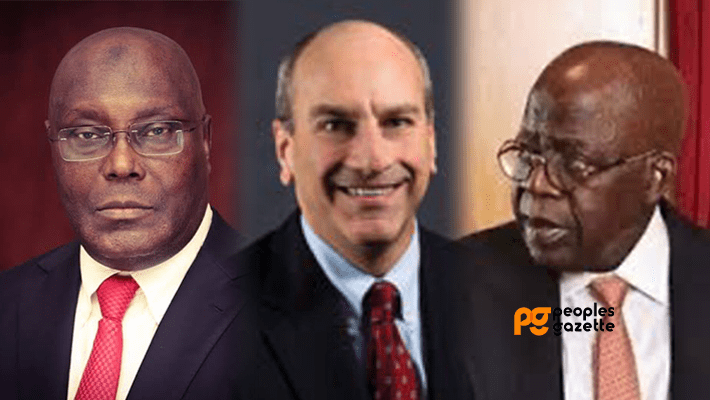U.S. Court backs Atiku, demands Chicago University release Tinubu’s records
Peoples Gazette reports a significant victory for Atiku Abubakar, the presidential candidate of the Peoples Democratic Party (PDP), in his ongoing effort to challenge Bola Tinubu’s eligibility for the Nigerian presidency.
A federal court in Chicago ruled on Tuesday night that Chicago State University (CSU) must provide all records related to Mr. Tinubu to Mr. Abubakar within two days.
According to the ruling seen by Peoples Gazette, the former vice-president had sufficiently demonstrated the need for these records.
Judge Jeffrey Gilbert also ordered the deposition of designated CSU officials within two days after the release of the records, stating that this process could occur during the weekend if necessary.
READ ALSO: Chicago University approves conditional release of Tinubu academic records to Atiku
Mr. Gilbert’s ruling stated, “For all of the reasons discussed above, Atiku Abubakar’s application pursuant to 28 U.S.C. § 1782 for an order directing discovery from Chicago State University for use in a foreign proceeding [ECF No. 1] is granted.”
The court directed CSU to produce all relevant and non-privileged documents within two days.
Hours prior to this ruling, Mr. Abubakar had filed an appeal to the Supreme Court following the September 6 judgment of the presidential election petitions tribunal that had upheld Mr. Tinubu’s victory.
On August 2, Mr. Abubakar had filed an application for the court to order CSU to produce documents related to Mr. Tinubu and requested permission to have the school’s administrators authenticate any documents submitted under oath.
Mr. Abubakar argued that these documents were crucial to his ongoing challenge against Mr. Tinubu’s election earlier this year.
He contended that Mr. Tinubu should not have been allowed to run for president due to allegations that he had submitted a forged document under oath, in violation of the Nigerian Constitution.
Section 137 (1)(j) of the Nigerian Constitution (amended in 2010) specifically stated that no one could be legitimately elected president of Nigeria if they “had presented a forged certificate to the Independent National Electoral Commission.”
On June 17, 2022, Mr. Tinubu had submitted a certificate to INEC that was purportedly issued in 1979 and signed by Elnora Daniel. However, Ms. Daniel had only arrived at CSU in 1998, 19 years after Mr. Tinubu was said to have graduated.
She left the school in 2008 following a financial mismanagement scandal, or 14 years before June 2022 when CSU issued a fresh certificate in Mr. Tinubu’s name under subpoena from a Nigerian lawyer who had inquired about Mr. Tinubu’s education there.
These irregularities prompted Mr. Abubakar to file the suit, compelling CSU to produce records relating to Mr. Tinubu and make its top officials available for deposition to certify the produced records, according to the Nigerian opposition leader’s legal team.
During a hearing on the matter on September 12, CSU’s lawyer, Michael Hayes, stated that the school could not authenticate Mr. Tinubu’s certificate if asked under oath, although he confirmed that Mr. Tinubu attended the school and graduated in 1979.
Mr. Tinubu’s lawyers, led by Christopher Carmichael, argued against granting Mr. Abubakar’s application, claiming it was a frivolous expedition aimed at tarnishing the Nigerian president’s image. They also argued that the Nigerian Supreme Court would not accept fresh evidence that was not presented during the tribunal proceedings.
However, Mr. Abubakar’s legal team, led by Angela Liu, argued that the Supreme Court would consider these new facts under unique circumstances, especially as they were not available during the Court of Appeal proceedings.
Judge Gilbert emphasized that courts across the U.S. have traditionally taken a broad and liberal view in granting applications under Section 1782, a statute that allows the release of documents and evidence domiciled in the U.S. to be obtained and used in a foreign proceeding.
Follow the Neptune Prime channel on WhatsApp: https://whatsapp.com/channel/0029Va74ZvU2v1IqKByXoX3d
Do you have breaking news, interview request, opinion, suggestion, or want your event covered? Email us at neptuneprime2233@gmail.com


